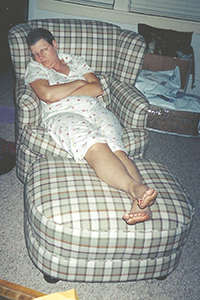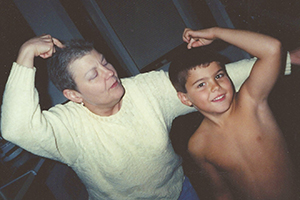By JULIE MINDA
In late 2001, at age 44, Toni Bannister received two life-altering diagnoses: In November that year she learned she had Stage 3 colon cancer; and in December she learned she had Stage 3 breast cancer. Both cancers had moved into her lymph nodes, and the breast cancer was a particularly aggressive strain.

Toni Bannister rests. At the time the photo was taken, in 2002, she was undergoing chemotherapy.
She had a left-breast mastectomy, chemotherapy and radiation to eradicate the breast cancer and several surgeries and chemotherapy to remove 12 inches of her colon and her lymph nodes.
"It was really exhausting, but I got through it by the grace of God," says the single mother of two sons, who now are adults. "But, it took me three years to get back on my feet."
Bannister, now 59 and a resident of Phoenix, has spent the last 30-plus years in the construction and home building industry — working in sheet metal, architectural drafting, interior design, floor covering, general contracting and home renovating. She had employment-based health insurance coverage until 2009 when she became self-employed and purchased individual insurance.
She was able to afford the premiums until 2009. "The market crashed, everything crashed. Construction companies were drying up. I lost my business. I lost my home.
"It got to the point where I couldn't cover the health insurance premium any longer. It was not doable," she says. In late 2009, "I wrote my last health insurance check, and I didn't know if I would ever have health insurance again."
For more than three years, she went uninsured. "I was walking in the dark. I literally had no idea whether my cancer had returned," she says, since she could not afford the yearly colonoscopies and every-three-months blood work to determine whether her cancer was resurfacing.
Bannister says, in 2010, she was "on pins and needles hoping and praying for health care reform to pass. When the Affordable Care Act was enacted, I said, 'thank you, God,' because I knew I could get insurance, even with my pre-existing condition."

Toni Bannister and her son, Austin Bannister, clown around. At the time of the photo, in 2002, Toni Bannister was undergoing chemotherapy. Austin was 6 at the time.
Bannister says she rushed to sign up for marketplace insurance as soon as it became available to the public and has been insured since. One of her sons, who is 21, is insured under her plan as well. Currently, she has a $2,000 annual deductible and pays a $150 per month premium after a government subsidy is applied.
Once insured again, Bannister resumed her cancer screening regimen and learned the cancer had not returned. "It was miraculous," Bannister says.
At the urging of her oncologist, Bannister underwent genetic testing in June 2015 to determine whether she had a genetic profile that made her vulnerable to certain aggressive cancers. The testing revealed she had two genetic mutations, the BRCA2 gene and the MSH2 variant mutation. According to the National Cancer Institute, BRCA genes produce tumor suppressor proteins; and when they are mutated, or malfunctioning, "cells are more likely to develop additional genetic alterations that can lead to cancer." The MSH2 mutation impacts genes that play a key role in DNA repair, according to information from the National Library of Medicine.
With the understanding that her positive test result indicated a high risk of future and significant cancer recurrence, Bannister underwent a total hysterectomy and right-breast mastectomy as a preventive measure.
Her two younger sisters received the same genetic testing, and the youngest sister received a positive test result. That sibling opted for a double mastectomy, as a precaution. Bannister's niece also has tested positive for the gene mutation.
Bannister says, "Insurance is a huge deal to me and my family, and I don't take any of this lightly," she says of the health insurance debate.
In 2013, she wrote to President Barack Obama, relating her story, praising his work passing health reform and asking him to continue to fight to preserve health care access. Former members of the Obama administration encouraged her to record her story at ACAWorks.org, a website from the nonprofit Center for American Progress Action Fund. That organization is a nonprofit, nonpartisan policy institute and advocacy organization. Bannister shared her story on the website, and she agreed to be in one of the center's commercials timed to the debate around health reform repeal and replacement earlier this year. She's been interviewed by several media outlets. Telling her story, she says, is a way to help other people.
She's watching the health care repeal and reform debates in Congress very closely. "I've been beside myself with anger, and fear and helplessness. I've been worried sick since Republicans took control and promised to repeal Obamacare. I could lose my previous security, as could my sister, my niece and others in my family," she says.
Copyright © 2017 by the Catholic Health Association
of the United States
For reprint permission, contact Betty Crosby or call (314) 253-3490.